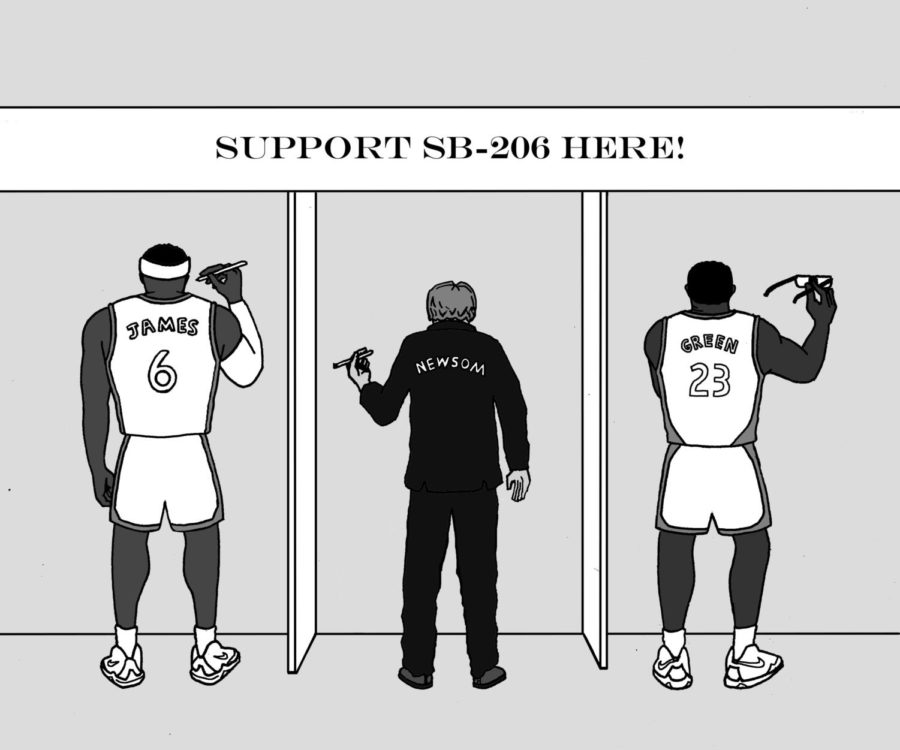California’s game-changing law allows payment of college athletes
On Monday, Sep. 30, California Governor Gavin Newsom signed SB-206, a bill that will allow athletes at California colleges to profit off the commercial use of their names, images, and likenesses. Newsom signed the bill on television as a guest on “The Shop: Uninterrupted,” an HBO series produced by NBA athlete and political activist LeBron James.
When it is implemented in 2023, SB-206 will be the first bill to override the NCAA’s regulations preventing college athlete payment.
The bill has elicited strong reactions from NCAA representatives. In a letter to two California State Assembly members, NCAA President Mark Emmert wrote that the bill would “create local differences that would make it impossible to host fair national championships.”
In an interview with the Urban Legend, Williams College Athletic Director Lisa Melendy predicted that the bill’s implementation could impact California schools’ participation in nationwide tournaments. “I think [the NCAA] would kick them out,” she said.
However, the exclusion of California schools from inter-state play could be complicated by the introduction of bills similar to SB-206 in other states. Since Sep. 21, state lawmakers from Colorado, New York, Washington, Maryland, and South Carolina have proposed bills that would allow some form of payment for college athletes.
While the majority of proposed bills allow for endorsement deals and licensing, some would require colleges to pay students directly. On Sep. 18, New York State Senator Kevin Parker introduced a bill that, in addition to providing athletes with the rights to their names, images, and likenesses, would require collegiate athletic programs to give 15% of their annual revenue to their athletes.
Melendy noted that bills calling for colleges to pay their athletes would not affect all schools the same way. “There are so many schools that are not revenue-producing… only a handful of schools—maybe 30—actually make money,” she said.
Nancy Skinner, the California State Senator who authored SB-206, explained that the intention of the bill is not to put financial pressure on colleges but to allow athletes the same rights other students are given. In an opinion piece published in the Orange County Register on June 2, Skinner wrote that “the Fair Pay to Play Act. SB 206 would sack the NCAA’s exploitative and anti-competitive rules by allowing California college athletes to participate in the free marketplace—just like all other students can do.”
Melendy warned that allowing athletes to receive payment of any kind could perpetuate the revenue-centric culture of college sports. “I feel like the primary focus of intercollegiate athletics should be education, and this makes it more of a business model than an educational model,” she said.
In a letter to Governor Gavin Newsom, the NCAA Board of Governors said that SB-206 “would erase the critical distinction between college and professional athletics.”
Melendy has advocated for fundamental changes in the ways colleges treat athletes without introducing payment. “We’re not talking about how to protect students and get them good educations and keep them safe from abusive coaching — instead we’re saying we’ll just pay them,” she said. “It seems like such an easy solution, but it will protect so few and it won’t really help protect athletes from being abused by the system.”
Concerns around the bill’s impact on the NCAA and college sports as a whole will need to be answered before its implementation in 2023. For now, though, protests against the bill have been stifled by those who have adamantly supported the change SB-206 could bring. “This law is a GAME CHANGER,” LeBron James wrote in a Sep. 5 tweet. “College athletes can responsibly get paid for what they do and the billions they create.”












